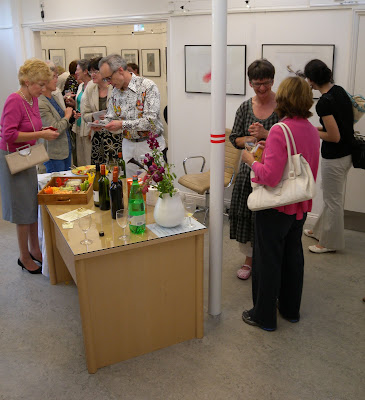Thursday, 10 June 2010
"Bad habits die hard"
Yesterday marked the start of this year's Cheltenham Science Festival, which seems to attract bigger audiences year by year: certainly, if the crowd at the event with this title last evening is anything to go by. Jonathon Porritt was talking to psychologist Stuart Derbyshire, of Birmingham University's School of Psychology, and the ESRC's Dale Southerton about why we find it difficult to change our behaviour.
Dale preferred to consider habits, not as addictions we needed to kick, but as essential matters of routine. They are shaped by our daily context. So, the development of deep freezes – which has happened at a rate "faster than that of the internet" – gets us into a dependency on out of town supermarkets: we have become locked into the freezer habit. And power showers lock us into more water use, as few of us use them solely as an alternative to the bath. Our need is to design habits that are more sustainable: what about Tesco's turning into a food delivery service only, and converting their stores into laundrettes? Tesco vans could then return full of our dirty washing when they have delivered the groceries, and millions of home washing machines would never need replacing.
Stuart, however, generally took quite a contrary tack – possibly for the sake of argument, but I rather doubt it. "I refuse to wash my yoghurt pots," he boasted. Che sarà, sarà. But that drip in the background didn't turn into a cataclysm, at least while this hour lasted.
Labels:
Cheltenham Science Festival,
climate change,
Porritt
Wednesday, 9 June 2010
A moral climate
Michael Northcott came to Cheltenham last evening, to address a Cheltenham Inter Faith meeting. His talk was based upon his 2007 book, "A moral climate: the ethics of global warming."
Professor Northcott comes across less as an academic (he is Professor of Ethics at Edinburgh University) than as a campaigner. Not that I have anything against a passionate speaker, but I emerged from the normally tranquil setting of the Friends' Meeting House feeling rather shell-shocked.
Or should that be "Shell shocked"? The first part of the Northcote fusillade was aimed at the oil companies. "Shell paid my school fees... but oil and blood have often intermingled," he told us. Tar sand extraction was "an unbelievably filthy process." And he had brought along the images to prove it.
Professor Northcott's thesis is that inequity is the central feature of the climate crisis; that those who suffer are least responsible, whilst those who are the cause are least affected. The climate, he says, is a global commons, and commons are not traditionally managed by either markets or states; yet the atmosphere is now being "enclosed" by the carbon emissions trading procedure. Climate change cannot be resolved by emissions trading: we have to "keep it in the ground".
The faiths can contribute two things towards meeting this challenge. First, the dimension of healing and restoration (in Christian terms "resurrection"); and secondly their sense of posterity: again, as a Christian, he pointed to the Communion of Saints: we worship God in churches which are traditionally built with graves - containing the bodies of the Saints - all around them. "I am a hopeful person," he concluded (albeit with a rare note of hesitation in his voice).
Wednesday, 2 June 2010
Birds of passage
Nicki Gwynn-Jones ARPS has a new exhibition of her photographs in Cheltenham: it opened this evening, "A bird's eye view". Her stunning ornithological treatments are shot in Florida, whither she commutes along with her husband. ("How long, O Lord?" It's all very well dedicating your show to those rescuing sea birds on the Gulf of Mexico's shores, but don't airoplanes run on... oil?)
Nicki is sharing the Gardens Gallery this week with Helen Dewbery LRPS, whose photography is less spectacular, but in a way more coherent. Both shows are worth a visit, I'd say. Especially on an evening like tonight, when the Montpellier Gardens are to be seen at their most vibrant. What a joy it is to live in Cheltenham!
Labels:
Cheltenham,
Dewbery,
Gardens Gallery,
Gwynn-Jones,
Montpellier
Subscribe to:
Posts (Atom)





